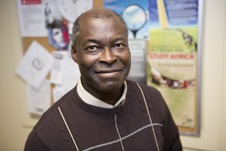In Ghana, are new resources a blessing or curse?

Kwamina Panford, an associate professor of African American Studies at Northeastern University, wants to know whether the African nation of Ghana will fall victim to the Resource Curse.
That is the phrase social scientists use when countries plentiful in natural resources mismanage those resources, often resulting in unbridled conflict and corruption. Panford has been awarded a Fulbright scholarship to study in Ghana and determine whether the country is likely to manage newfound resources wisely and well.
“Ghana today provides exceptional opportunities to social scientists interested in the relations between development, governance and natural resources,” said Panford. “It is deemed to be successful at establishing democratic governance while the nation prepares to utilize new revenues from its first commercial oil and gas fields, located some 60 to 70 miles from its shores.”
For these reasons, the country is becoming a test case for whether oil will lead to socio-economic development or be a source of new social and political ills, including violent conflicts that have ravaged other African nations, he said.
Panford will spend his sabbatical studying how Ghana’s government utilizes the oil and gas from the country’s newly discovered deep-sea oil fields. He will also lecture about Africa’s political economy and the role of international organizations at the University of Cape Coast.
“Ghana’s president has said that he wants the oil to benefit all people in Ghana. The country has an opportunity to become the model for country-managed resources,” Panford said.
This year, Ghana’s parliament passed the Petroleum Revenue Management Bill, which promises greater transparency and accountability. The bill gives the government permission to use 70 percent of oil revenues to support its budget, while 30 percent is saved in “Heritage and Stabilization” funds.
As he studies in Ghana, Panford is looking forward to witnessing first-hand how the country implements the bill.
This new international research opportunity will also mark Panford’s return to Ghana. He has been a consultant for the Institute for Development Studies, where he traveled to Ghana’s coast to study the economy and environment and document the scene prior to oil production. The Fulbright scholarship will allow him to continue conducting his research in an area of particular passion for him.
“I feel doubly fortunate because the Fulbright is not only an academic opportunity, but it also involves my life interests,” Panford said. “The award will enable me to study how Ghana and other African countries are governed and how oil impacts governance, social and economic development. I will incorporate this experience into my courses at Northeastern in African American Studies and political science.”





